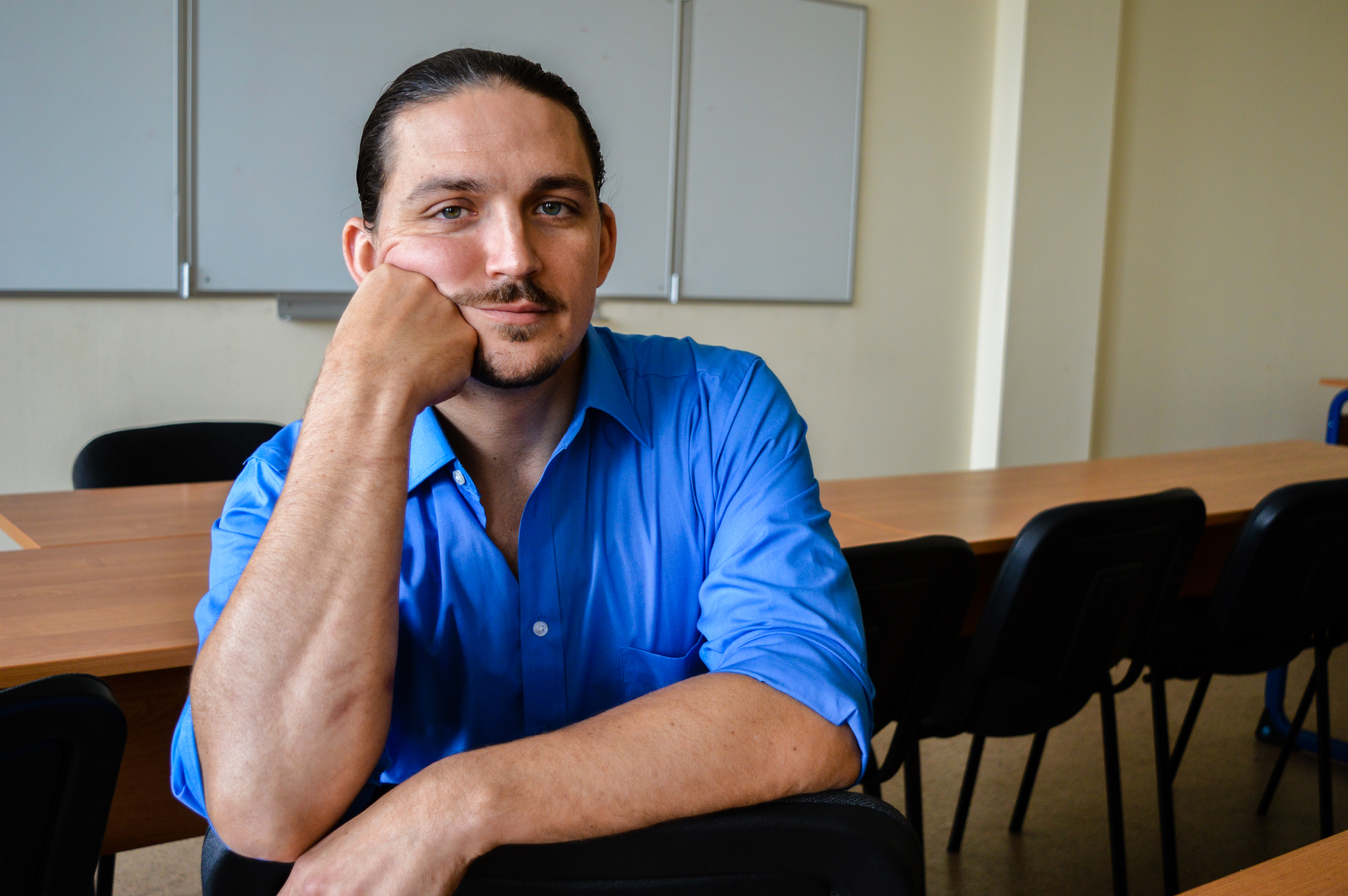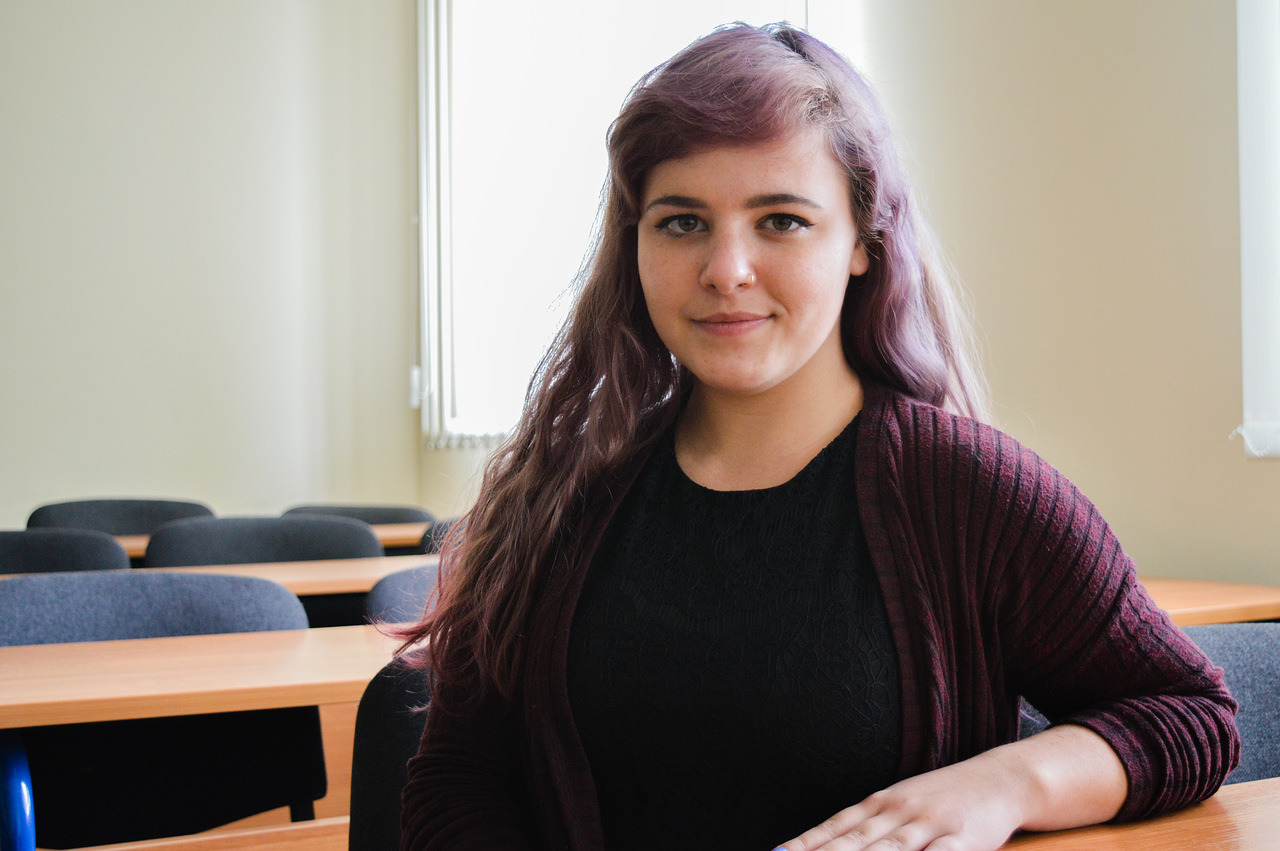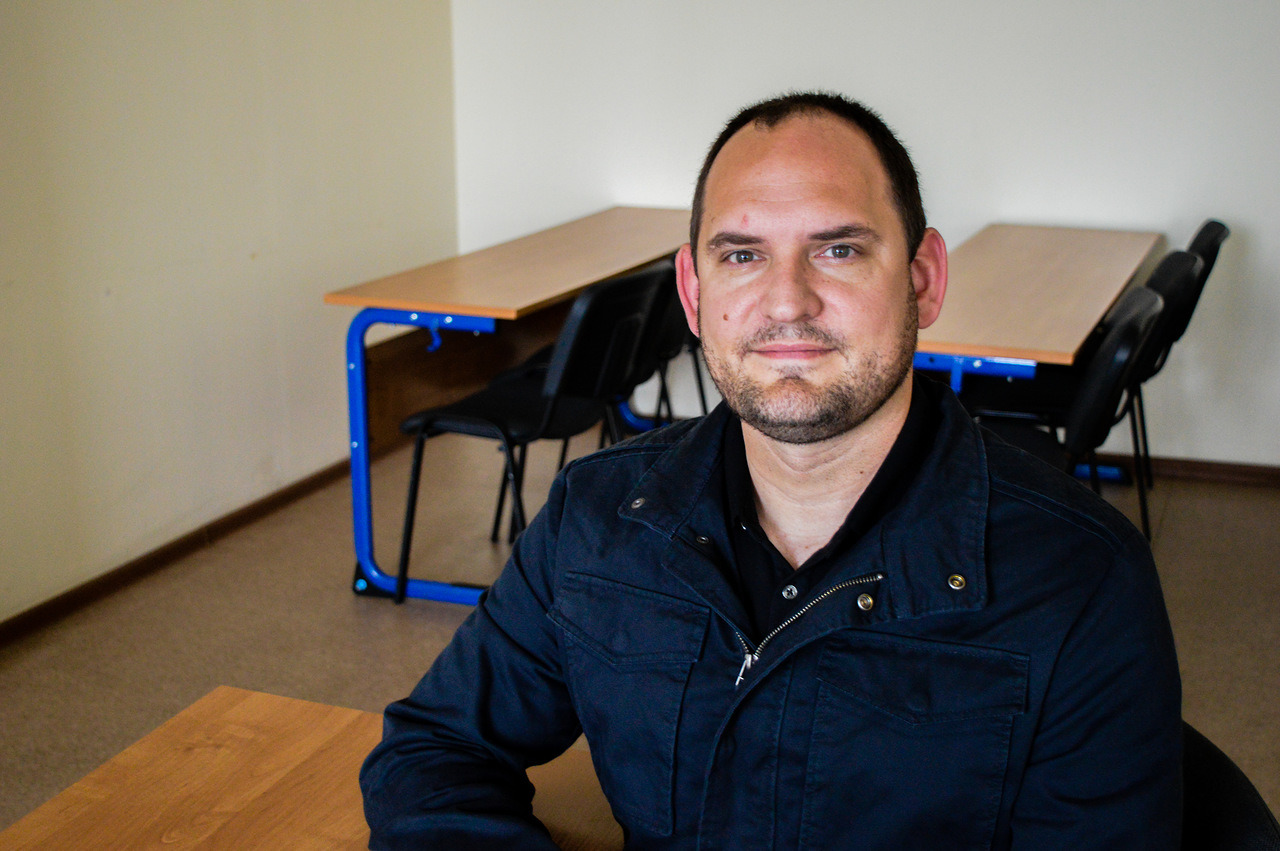Demand for Russian Language Classes Grows
Fifteen American students have come to HSE to study Russian as a foreign language as part of ‘USA in Russia’ study abroad programme developed by the University of South Alabama in partnership with HSE since 2014. Every other year, Nicholas Gossett, Assistant Professor of Russian and Applied Linguistics, brings a group of students to Moscow to study the Russian language as well as attend lectures and seminars on Russian culture, history, business, and other subjects. The goal is for students to not only improve their knowledge of the Russian language but to also make life-long connections in Russia which will help them in the academic, professional, and personal life.
The students come from all different backgrounds and majors. A number of them are non-traditional students (students who left school and came back to finish) and have full-time jobs while also studying. Some have a military background while others have a business background. Most have been studying Russian for at least 3 years at South Alabama while some have just started this past year. All of them see themselves utilizing the knowledge of Russian in their future. They have a deep respect for the Russian culture and Russian people in general. A few want to come back and live in Russia to teach English while some want to return to HSE for a Master’s programme. Some students already took part in the HSE International Olympiad that was held this spring. A number of them were offered admission and Russian government scholarships. Several students will also take part in HSE Summer University this year.
A lot of times people are afraid of Russia, they don’t really understand it, and they think when they get here as an American, they would be treated one way, but everyone is so nice and wants to talk to them, either to practice their English, or find out why they’re taking Russian
The students attend language classes with HSE instructors. The classes are supervised by Olga Eremina, head of HSE Russian as a Foreign Language Centre. In addition, Professor Gossett gives lectures on various aspects of Russian culture, history, and language. There is also a cultural programme with trips to the Golden Ring and St. Petersburg as well as some tours in Moscow. ‘The Stalin bunker is always a big hit with the students,’ says Professor Gossett. ‘They also love the chocolate factory, Babaevskaya. And they love the Kremlin, of course, the Tretyakov Gallery, the History Museum in Red Square, St. Petersburg and Peterhof. We really don’t get complaints. It’s the first time a lot of students have been in a big city with a metro, and they really enjoy the metro. It’s easy to use! They like being able to go out and meet people their age that are Russians and are interested in talking to them. A lot of times people are afraid of Russia, they don’t really understand it, and they think when they get here as an American, they would be treated one way, but everyone is so nice and wants to talk to them, either to practice their English, or find out why they’re taking Russian. It’s a different life and it’s a fast-pace life. But I think they get into the groove, and it’s a little difficult for them to go back to life where we live. It’s a lot more slow, and it’s much hotter. Besides, the students love the food here. We’ve been to some Georgian restaurants, some Russian restaurants, and the quality of food is better.’

Nicholas Gossett, Assistant Professor of Russian and Applied Linguistics
The students spend a lot of time in the dorms with HSE students and most have HSE students as roommates. This gives them extra time with the language and an overall better experience. Some tutors are also working with the students on Sundays and Monday-Wednesday evenings. Some of the students have become friends with the tutors and do go out to see the city with them as well. As Professor Gossett explains, he wants the students to make connections that they can keep for life. ‘I want them to have a reason to come back to Russia. Most of my former students have either been back or planning to come back, keep in touch with their roommates and friends.’
‘I am so glad to be working with a university like HSE. Everyone is extremely friendly and wants to continue to build amazing relationships to improve both the lives of HSE and South Alabama students,’ he adds. ‘I come from an average American family and understand where my students come from. I first started studying Russian in 2002. I have been coming to Moscow since 2005 and absolutely love the city. Now I teach Russian and bring students to Russia so they too can see how amazing and hospitable Russians really are and how amazing the culture is here in Russia. My time in Russia has given me a different outlook on the world and has made me an overall more well-rounded individual. I look forward to expanding our program me and bringing even more students to Moscow in order to create their own experience.’
I am so glad to be working with a university like HSE. Everyone is extremely friendly and wants to continue to build amazing relationships to improve both the lives of HSE and South Alabama students
This programme for language studies in Moscow will continue every other year as demand increases for Russian language classes. As Professor Gossett explains, ‘a lot of it due to the fact that we are one of the only programmes that still exist in the entire region. We have a full major. Our programme has been around for about 40 years. We also offer one of the only online Russian classes in the country, and we’ve been pretty successful with that. Our students have gone on to do things like come back and teach, like me, to work for the State Department, or in the military. We also have a couple of people doing business in Russia. Besides, people just don’t want to take the same thing they took in high school. If they took French or Spanish previously, they want to learn something different, like Russian. We tend to have students that are motivated, which is why we are able to work better with them. We are really buying into the Vygotsky theory of socio-cultural learning that people that are almost family together learn better from each other, because there’s no anxiety that they would make a mistake or think that someone is better than you. We’ve really tried to promote that with our students. And as long as they buy into what we’re doing in our programme, they are successful. We’re trying to make this programme not just about language and politics, but we want them to have a full, broad understanding of Russia, so that wherever they go in their career, academic or professional, they have different options and different interests.’
Professor Gossett is working on some other projects with HSE as well. One is a direct exchange with the Linguistics programme at HSE that will enable one HSE student to come to South Alabama and practice working with foreigners learning Russian as well as take classes in the College of Arts and Science, Business, and/or Education. At the same time, one of American students will come to HSE and take classes and various subjects while also working to help students learning English at HSE. ‘Recently, I have been working with Oxana Budjko on some other possible summer programmes for students from any major looking to learn more about Russia,’ explains Nicholas Gossett. ‘And we do hope to continue serving as a host for the HSE International Olympiad, which we successfully held this year for the first time. Hosting the Olympiad also helps to get more students in the Russian programme, because they say, I never thought about going to Russia, but now I should take Russian.’

Nicholas Robert
I began studying Russian in 2010 at the University of South Alabama then I had to leave the university. Since then, I came back last year in the fall and now I’m studying with Dr. Gossett. Russian language is my major. It’s funny that all the Russian majors at the time, we were just saying ‘why not?’, and that was what started us on our path. Mine has taken me a little longer than most, but I’m still glad that I took it. I wanted to do something different, to offer myself more opportunities and open more doors for myself. Learning a second language offers opportunities that are not necessarily open to others. Whether it be because people aren’t willing to take on the challenge of learning a case-based language system, or one that has no cognates, or putting themselves in a geopolitical situation they may not be comfortable with. It’s more of a specialized thing, and I feel it is more marketable with any skill set. That’s what brought me to learning the Russian language. Of course, Russian is a difficult language to learn for a native English speaker. The only thing that has helped me at all is studying a little bit of Latin and understanding how the case system works and why it works the way that it does. Grammatical structures are very strict and very different from English, so it’s not easy, but it’s quite rewarding. Here in Moscow I’m also exploring opportunities for entrepreneurial endeavours, what markets are available, and what might be a viable option for me in the future.

Mimi Walker
I can probably track my interest in the Russian language back to when I was in 10th grade, and my high school had an exchange programme, and they brought some Russian students to our school. I made friends with one of them and figured that ‘hey, this is a really cool language’. And I’d always loved languages anyways. My childhood dream was to learn Italian and move to Italy, but I chose Russian instead. When I was in senior high school, I decided I wanted to go study under Dr. Gossett’s programme. I moved to Mobile and started school there in the fall of 2014. Now I’m a major in Russian language and international studies. I’ll be graduating this fall. I think knowing other languages is a super valuable asset. Hopefully, I could use it as a tool for whatever I decide to do, whether it be in politics or in business. My biggest dream is to work for NASA but I do plan on going on to a grad school before doing anything else.
I would say, my first ‘wow, I’m in Russia!’ moment was visiting St. Basil’s. It’s awesome, I loved it – it’s so beautiful. However, on the plane I did have a pretty good Russian experience. The lady that sat next to me was nurturing me and taking care of me - she was a very nice Russian lady. So I felt like I was really welcome to the country before I even got here. So far, I love it. I wish I was a little more proficient in my speaking, in my knowledge of the language.

Ted Johnson
I’m a police officer. I was getting a degree while working and one of the requirements was a second language. I wanted to do something out of the norm, not common. When I saw Russian on the list, it interested me. I’ve been in advanced classes for most of my life, so when I was younger, 7 or 8 years old, we studied USSR. I loved it, and St. Basil’s has been in my head since I was 7. I always thought that it was amazing, beautiful. I decided to learn Russian and see how well I could do. After the first semester, I was in love with it. I changed by minor from business to Russian language. After talking to Dr. Gossett and doing another semester, I made Russian my second major. Now I’m doing my major in Russian and in criminal justice. I’ve enjoyed Russian more than I have the criminal justice aspect of school.
Learning Russian is a big challenge, but I’ve enjoyed it. If I had to do it again, I’d stick with Russian and maybe I would have started this sooner. A lot of the difficulty has been with the cases. But being here, they’ve been able to help me in taking the grasp of it a lot better. This has really thrown a kink in my profession. I’m a police officer now, and found something better. I’d like to do something that would involve speaking Russia, whether it’s coordinating with business or maybe State Department post here, or even perhaps teaching English once I grasp this language a little more. Whatever I do, I want to continue to further my Russian skills.
Every country has its own portrayals on TV but actually Russia is nothing like it has been portrayed. And I didn’t think it would be. The people have been great. When they look at us and see the confusion in our eyes, a lot of people come up and help out. The city is wonderful. It’s really motivated me to do better here. I’m getting around bit by bit. I’ve learned the metro system, that was my biggest goal, and I completed that this week. Not the whole system, but how to get on my way back if I randomly get lost. I haven’t taken on the trolleys yet, and that’ll be next.
Photos by Evgeny Voynilo
See also:
‘I Will Soon Build the Confidence to Express Myself Well’
Learning Russian is one of the challenges international students face when they come to Russia. HSE University helps them not only with Russian classes, but with informal events such as the Russian Speaking Club, where they can absorb the language in a relaxed and non-competitive setting. The HSE News Service talked to the organisers and participants of the club about their impressions of the first meeting and plans for the future.
‘Everyone Quickly Engaged in Conversations and Demonstrated Their Creative Thinking’
The online Russian Speaking Club opened only a month ago, but has seen a rapid growth in the number of participants. Every week, the club holds free online meetings where participants and a Russian language tutor discuss various topics related to the Russian language and culture. Below, the club leaders share their impressions and plans, which include going offline.
Russian Speaking Club: Practicing the Language and Meeting New Friends
For HSE Preparatory Year students, the Russian Speaking Club is a way to improve their language proficiency in a relaxed atmosphere. At this year’s first such event, they discussed online communications and social media. Michael Dzodzoe from Ghana and Leen Sabbagh from Syria shared their impressions with the HSE News Service.
HSE Students Support Phonetics Competition for Chinese Students
The Glinka State Conservatory in Nizhny Novgorod has held a phonetics competition in Russian as a foreign language for Chinese students of the preparatory department. The spectators, jury members, and support team of the competition included HSE University-Nizhny Novgorod students of the Bachelor’s in Foreign Languages and Intercultural Business Communication, Academic Supervisor of the programme Marianna Korenkova, and Chinese language teacher Elena Ammosova. The Chinese students opened the event with performances of famous solo works in Russian.
‘I Made a Lot of Friends and My Speaking Level Improved’
On December 23, students of the HSE Preparatory Year got together for a festive Russian speaking club. They expanded their vocabulary and cultural outlook by immersing themselves in Russian winter holiday traditions and even played the role of Ded Moroz—the Russian Santa.
‘A High Concentration of Intercultural Communications’
The team of the HSE International Preparatory Year said goodbye to its students at a graduation party that took place at the HSE Cultural Centre. 197 students from 58 countries graduated from the programme this year. They learned Russian and profile subjects in Russian, which has helped over 100 of them to enrol in degree programmes at HSE University.
International Students Learn Russian Through Theatre Performance
International students at HSE University acted in and shot a film-play in Russian as part of the ‘Russian through Drama’ course. The students spent a semester preparing the play, immersing themselves in the Russian language and cultural environment. The HSE News Service spoke with the instructors and students about their work on the play and their Russian studies.
Applications Open for HSE University Intensive Summer Language School 2022
This summer, the HSE University Russian Language Centre will offer intermediate and advanced Russian-language students an opportunity to learn and practice their skills while immersing themselves in Moscow life.
Let's Learn to Speak Russian
A growing number of HSE University’s international students are actively learning Russian, even if their degree programme is taught entirely in English. To help them build fluency, the HSE University Preparatory Programme launched a Russian Speaking Club for its students in March 2021. Now, all HSE University's students, regardless of the programme they are in, can take part in the meetings.
‘I Really Enjoy Learning Russian’
Karla Sofía Torres Pesquera is an exchange student from ITAM, Mexico City. She is spending one semester at HSE University, from January to June. She has talked to HSE News Service about the courses she is taking this semester and also described her life at the HSE dorm.


